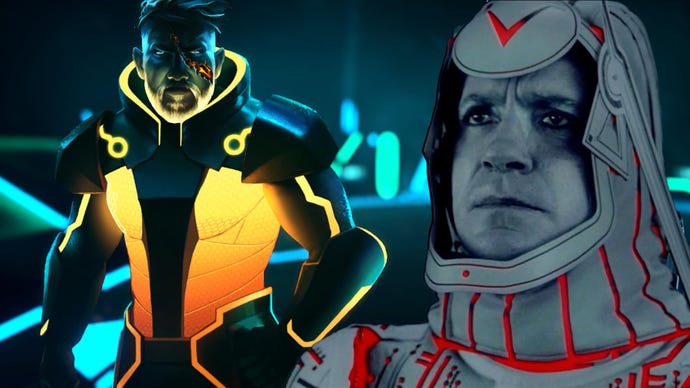Tron: Identity is the perfect Disney universe for Bithell Games to play around in
A surprising culmination of everything the studio has been building towards since Thomas Was Alone.
^Watch our Tron: Identity video review above!
TRON is one of the most historically significant films in Disney’s catalogue. Perhaps more than any other movie, it was massively ahead of its time: the techniques and technology developed in order to shoot it have in the many decades since its production become the norm for big-budget filmmaking. It had a huge big-budget sequel, an animated spin-off series, and a litany of video game adaptations (including the marvellous TRON 2.0, which still works as a worthy sequel to the original film). So why has this major franchise that hasn’t produced anything since the early 2010s come back with, of all things, a visual novel?
See, TRON is an odd one. The original film, which I love, is as silly as it is pivotal. The liberal use of computer-generated imagery, which looks proterozoic by today’s standards but oddly timeless as a result, combined with the process of shooting most of the film against nothing in order to transplant the actors into a world conjured out of CG and matte paintings – a film where almost every shot is a visual effect – was pretty much unheard of at the time.
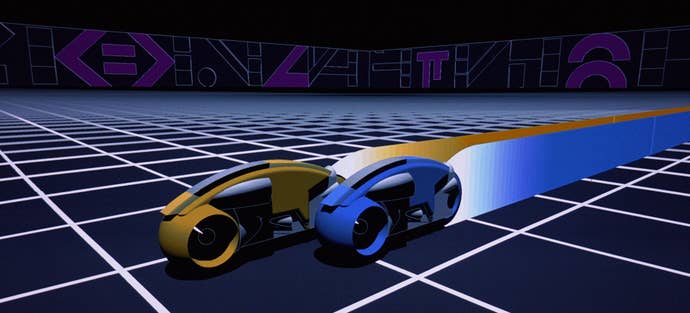
Now, it’s how the vast majority of Big Screen Extravaganzas are shot. The Star Wars prequels infamously ushered in the de facto workflow for digital filmmaking, where the vast majority of the creative work is done in post, and actors doing acting are merely another plate in the compositor’s inbox. But it was Tron, in 1982, that first signalled where things were headed.
It’s a truly landmark film in terms of the craft of filmmaking. But time hasn’t been kind to TRON. It’s a hard thing to love because, let’s face it, it’s goofy as hell. They’ve got the late David Warner moping about in glowing spandex, for christ’s sake. They’ve got Jeff Bridges, the Prince Regent of Cool, looking like an absolute dork next to Bruce Boxleitner, who is mostly well known for being the commander on Babylon 5 (the least cool thing ever produced, and I say that as someone who loves it enough to have bought the 4K remaster on digital).
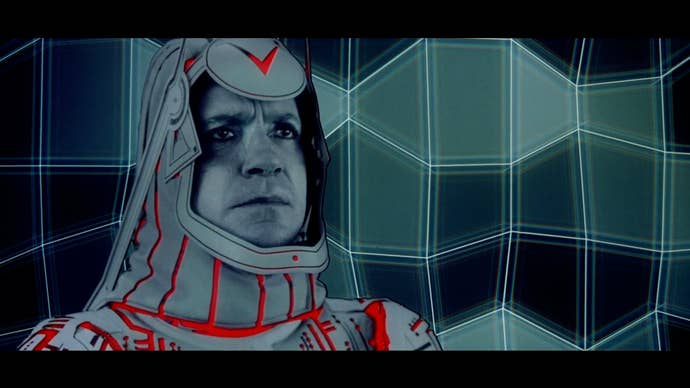
The 2010 sequel, Tron: Legacy, did a lot of file off Tron’s dafter edges, re-envisioning The Grid as slick, cool, moodily-lit cyberpunk cityscape: a new kind of Tron where everyone gets their trousers at Cyberdog. But most people thought it was a bit naff, and ultimately its only real cultural impact was that the Daft Punk soundtrack was Quite Good and they used it in Top Gear quite a lot afterwards.
So TRON is a hugely important, historically significant, and very well known property with a massive fanbase. But every time it’s emerged, it has subsequently flopped. So it makes perfect sense, then, to bring it back in a form that doesn’t take hundreds of millions of dollars to produce. To allow the audience to dip their toes back into the energy pool without committing to so much as a single Jeff Bridges breakfast order. Enter Tron: Identity, a game which in true Bithell Games style does one hell of a lot with very little.
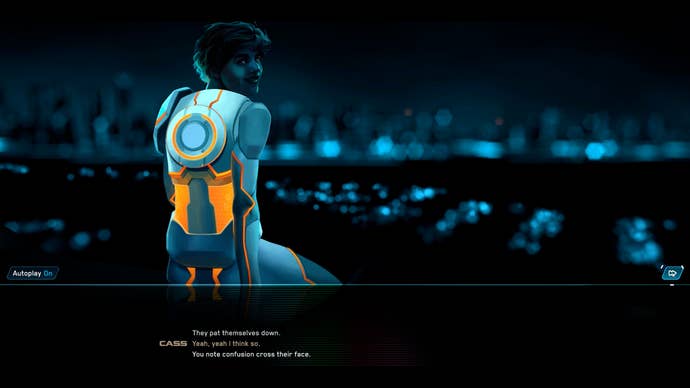
This is one of the most perfect pairings of game studio and IP that there has possibly ever been. In stark contrast to, say, John Wick Hex, which a lot of people felt just wasn’t the spectacular, triple-A treatment that John Wick deserves. Bithell Games emerged onto the scene with Thomas Was Alone, an endearing story about several four-sided shapes of different lengths and widths, which were actually representations of rogue AIs which had achieved sentience and were helping each other navigate the guts of a vast computer system.
I mean, that’s a TRON game in all but name. I’m almost kicking myself that I didn’t see it before. But the rest of Bithell’s catalogue reads almost like a mood board of Tron pitch ideas. Consider Volume, the Metal Gear Solid-lite, neo-Robin Hood extravaganza that, after Thomas put Bithell on the map, ensured that he would stay. Its art style is, and one again I’m kicking myself for not clocking this at the time, pure TRON. The spandex, the glowy bits, the flat, gouraud-shaded surfaces. Slap a couple of futuristic motorbikes in there and Disney might have had grounds for legal action.
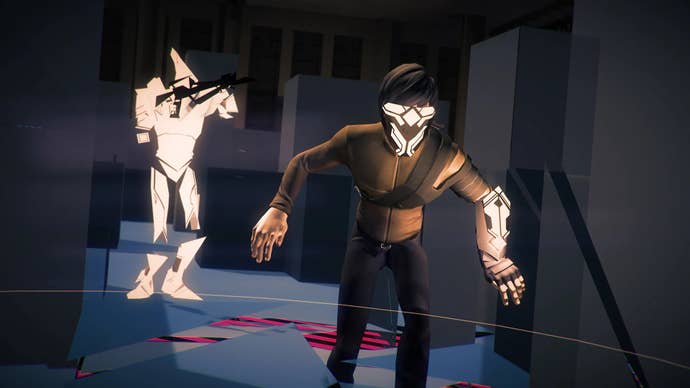
Of course, the most obvious lead-in to Identity is Subsurface Circular, Bithell’s incredible visual novel from 2017. Set entirely on a subway train carriage, it told the gripping story of a robot uprising through nothing but choice-and-consequence conversation and gorgeously realised visuals. It felt like a premium visual novel in the sense that its art seemed like it could have been cannibalised from a much more expensive game, and its writing was a masterclass in the slow reveal, with every layer the the detective mystery you’d been deposited into raising the stakes further and further until a finale that had as much impact as the final episode of, I dunno, one of those shows you like. I’m picking Deep Space Nine, substitute whichever one you’re into and don’t call me a weiner in the comments.
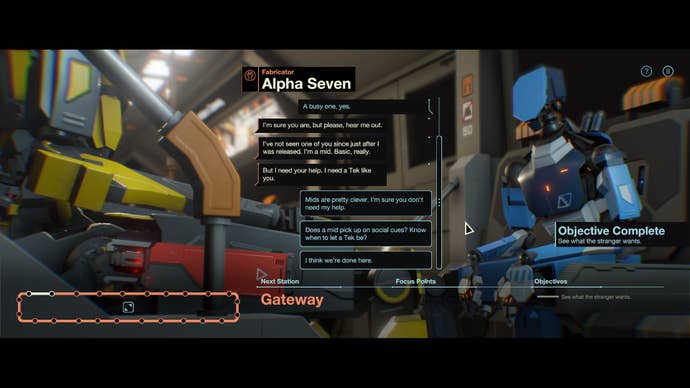
Finally, The Solitaire Conspiracy, with which Bithell Games attempted to revamp the classic card game for bored contact centre workers into something slick and stylish that could carry an FMV narrative, with power-ups that added a tactical element to those strategies that everyone had spent their entire lives honing while their boss wasn’t looking. Solitaire makes its way into Tron: Identity, very warped but nonetheless recognisable, as a defragmentation mini-game which serves as your only interaction with the game world beyond conversation. With it, you can uncover memories from NPCs, whose data streams have been disrupted by a mysterious explosion in The Grid’s repository building.
Tron: Identity is short, and set entirely within one location, but it contains a multitude of complex ideas, and touches on many of the more metaphysical aspects of TRON: are the users gods? Do they even exist? If they don’t exist, who wrote us? And so on. It starts, like Subsurface Circular, ostensibly as a detective story, but grows into something much larger, with profound consequences for the wider world. As the first step into a new era for TRON, it works beautifully and leaves you wanting more.
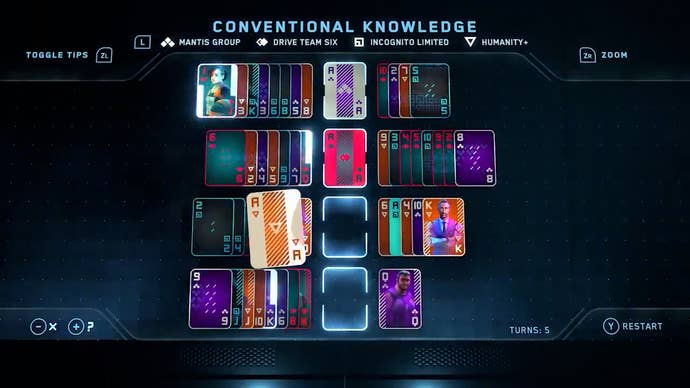
However it turns out, one thing is clear: Bithell Games can build big, world-shattering stories with the humblest of humble toolsets. Spielberg once explained that Laurence of Arabia is his favourite film because it uses nothing but captured light and sound – the most basic mediums available to a filmmaker – to tell one of the grandest stories ever told. Tron: Identity strives toward a similar ambition with a similarly fundamental toolset: scripting, interactivity, and art. I hope the story continues.
